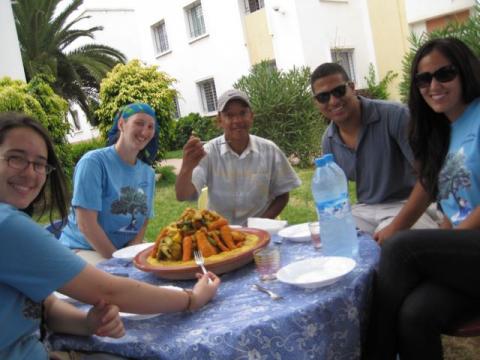Submitted by adriscoll

I was recently in Morocco with an organization called Grove of Hope, teaching planetary science in orphanages. This photo was taken during lunch, in the courtyard of a particularly nice orphanage.
Lunch was always a very extravagant event. I have to mention that this giant platter was meant for a grand total of 6 people; it was the second course of a 3 course meal, each course more impressive than the last. Meals usually begin with hot and cold “salads”, then comes a tagine like the one pictured above, and then a desert – usually fruit accompanied by the classic mint tea. This type of dish, meat and vegetables served over couscous, is reserved for formal occasions. Every day the food was different, and every day it was amazing. Moroccan food has an incredible amount of variety, since it has been affected by Arab, Berber, Mediterranean, and Moorish influences over the years.
Although I don’t claim to know much about their culture, I had several interesting conversations with our Peace Corps volunteer translators. I learned two very important things. Firstly, Burts Bees is worth a lot on the Peace Corps ‘black market’; second, food is a core component of the Moroccan culture. For a host to go to the market, buy a chicken and make, from scratch, a delicious lunch is the ultimate sign of respect. It shows thankfulness and means the guest holds a special place in the host’s heart.
After learning all this, I realized how much more those meals were than just delicious food. The giant platters of food are impressive enough, the meaning behind them blows me away.

After attending school on three continents, Anne Driscoll is finishing her high school career as an unschooler. She now speaks Spanish and Chinese fluently. Anne spends much of her time abroad learning about different cultures. She is currently focusing on Mapuche traditions and lemurs. In addition, she enjoys heliophysics, languages, and 3D printers.






